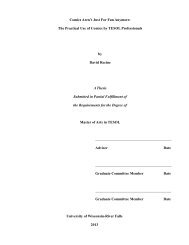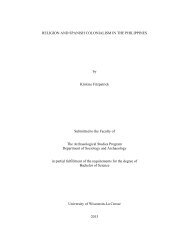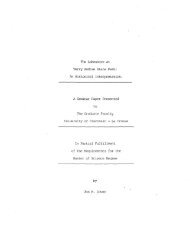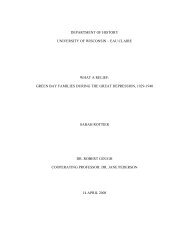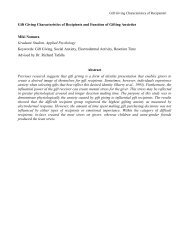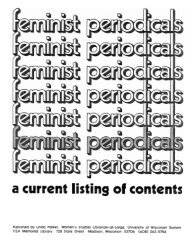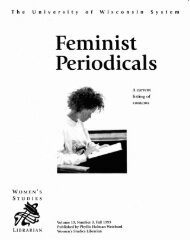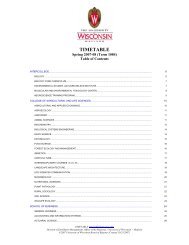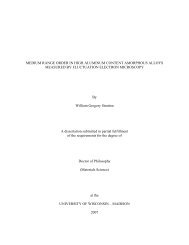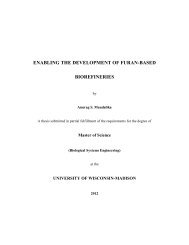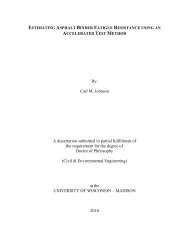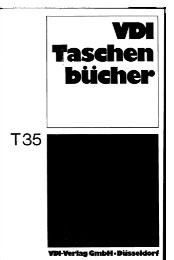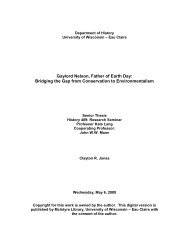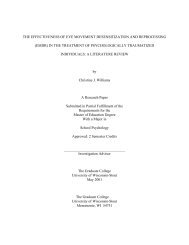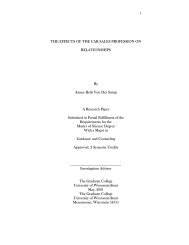1 CONFRONTS THE TEXTBOOK.. - MINDS@UW Home - University ...
1 CONFRONTS THE TEXTBOOK.. - MINDS@UW Home - University ...
1 CONFRONTS THE TEXTBOOK.. - MINDS@UW Home - University ...
You also want an ePaper? Increase the reach of your titles
YUMPU automatically turns print PDFs into web optimized ePapers that Google loves.
Page 18 FeminislCollediavl v.16.m.l. Fa11 1994<br />
ARCHIVES<br />
WOMEN OF WISCONSIN LABOR ORAL<br />
HISTORY PROJECT<br />
by Jamakaya<br />
Little has been recorded about women union activists<br />
in W~sconsin, a fact dramatically illustrated by Robert<br />
Ozanne's 1984 study. me Labor Movement in Wsconsin,<br />
which devoted only 6 of its 290 pages to working<br />
women. The Women of Wisconsin Labor Oral History<br />
Project was initiated in 1988 by union women determined<br />
to ensure that the contributions of women in the labor<br />
movement are documented so they can take their rightful<br />
place beside their union brothers in the annals of labor<br />
history.<br />
The Women of W~sconsin Labor Oral History Project<br />
was inspired by unionist Catherine Conroy and educator<br />
Kathryn Clarenbach, both of whom played leadership<br />
roles in the feminist movement in Wisconsin and nationally.<br />
The Project has so far interviewed twenty-six<br />
women who have played -- and continue to play - important<br />
roles in their unions. They come from diverse<br />
backgrounds and represent many different occupations.<br />
They hail from La Crosse, Wausau, Madison, Menasha,<br />
Whitewater, JanesviJle, and Milwaukee. Some began their<br />
union activism in the 1930's; others are making their<br />
marks today.<br />
All of the interviews offer revealing observations<br />
about how workplaces have changed for women over the<br />
years. They convey the struggles working women have<br />
had with employers and with their own union brothers to<br />
gainacceptanceand respecton the joband in their unions.<br />
The women interviewed touched on many topics,<br />
including: union organizing drives of the 1930's; the<br />
impact of World War I1 on working women; major strikes<br />
and the anti-union tactics of management; sexism and<br />
racism in the workplace; opening jobs previously re-<br />
stricted to men; the "double day" -- on the job and with<br />
the family at home; de-industrialization; the move to-<br />
ward privatization of public sector employment; and the<br />
impact of the feminist movement in changing both laws<br />
and attitudes about working women.<br />
The women interviewed include: Catherine Conroy<br />
and Ann Cnunp (CWA); Evelyn Do~er Day (ILGWU,<br />
UAW); Doris Thom (UAW); Nellie Wllson (Smith Steelworkers);<br />
Joanne Bruch (IVE); Leona Tarnowski (UPWA,<br />
UFCW); Darina Rasmussen (ACWA, OPEIU); Alice<br />
Holz, Helen Hensler, Helen Altstadt, Dorothy Jafferis<br />
(OPEIU); Martha Love, Patricia Yunk, Joan<br />
Zeiger(AFSCME); Lee Schmeling (GAKJ, GCIU); Florence<br />
Simons (AIW); Nancy Hoffamn (Plumbers); Judith<br />
Kuhn (a founder of Milwaukee Women in the Trades);<br />
Candice Owley -/AFT); Mary Ann Braithwaite<br />
(WFTIAFT); Evelyn Gotzion (FLU at Ray+%, UAW);<br />
Rosella Wartner (FLU at Marathon Electric); Cecilia<br />
Peterson (ATU); and Evelyn Hunholz (Women's Auxiliary).<br />
One non-W~sconsinite, singerlactress Ronnie Gilbert<br />
(Actors Equity, SAG, AFTRA), was interviewed in<br />
1992 while in Milwaukee to perform in her play about<br />
labor activist Mother Jones.<br />
In addition to distinguished service in their union,<br />
many ofthese women worked tirelessly in political cam-<br />
paigns and organizations like the Urban League, the Al-<br />
lied Council of Senior Citizens, the Wisconsin Action<br />
Coalition, and the National Organization for Women.<br />
Theirs is an impressive record of union solidarity and<br />
community service that deserves to be recognized.<br />
The Project prioritized interviews with retired union<br />
activists who made significant contributions over the<br />
decades, a sound decision given the subsequent deaths<br />
of four inte~ewees (Comoy, Holz, Domer Day, and<br />
Simons). Additional subjects were chosen based on recommendation<br />
forms distributed at State AFL-CIO<br />
Women's Conferences and other union gatherings. Attempts<br />
were made to achieve a balance of geographical,<br />
racial, and occupational representation. Organizers ofthe<br />
Oral History Project are aware that much more of the<br />
history of Wisconsin's working women is yet to be uncovered,<br />
but they believe they've made a significant beginning.<br />
All of the audio recordings, summaries thereof, and<br />
photos and memorabilia of the interviewees are avail-<br />
able in a special collection entitled "Women of Wlscon-<br />
sin Labor in the Archives Division ofthe State Histori-<br />
cal Society. The interviews, ranging from one hour to<br />
six hours, were conducted by Jamakaya (formerly J.M.<br />
Dombeck), a feminist writer and historian, and the Project<br />
was supervised by Joanne Rim. Funding was provided<br />
by the W~sconsin State AFL-CIO, the Wisconsin Labor<br />
History Society, IAMAW District 10, USWA District 32,<br />
and the Coalition of Labor Union Women-Milwaukee.<br />
For further information on the Oral History Project,<br />
contact Joanne Ricca at (414) 7714700, or the Archives<br />
Division of the State Historical Society of W~sconsin,<br />
816 State St., Madison, WI 53706, (608) 2646460.



